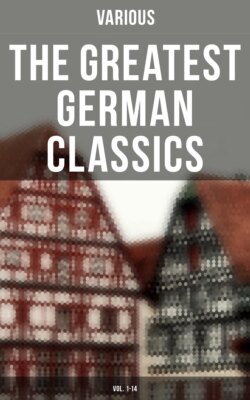Читать книгу The Greatest German Classics (Vol. 1-14) - Various - Страница 1612
На сайте Литреса книга снята с продажи.
FOOTNOTES:
Оглавление[Footnote 3: Though the Ideal images of youth forsake us, the Ideal itself still remains to the Poet. It is his task and his companion, for, unlike the Phantasies of Fortune, Fame, and Love, the Phantasies of the Ideal are imperishable. While, as the occupation of life, it pays off the debt of Time, as the exalter of life it contributes to the Building of Eternity.—TRANSLATOR.]
[Footnote 4: "Die Gesalt"—Form. the Platonic Archetype.]
[Footnote 5: This idea is often repeated, somewhat more clearly in the haughty philosophy of Schiller. He himself says, elsewhere—"In a fair soul each single action is not properly moral, but the whole character is moral. The fair soul has no other service than the instincts of its own beauty."—Translator]
[Footnote 6: "Und es wallet, and siedet, und brauset, and zischt," etc. Goethe was particularly struck with the truthfulness of these lines, of which his personal observation at the Falls of the Rhine enabled him to judge. Schiller modestly owns his obligations to Homer's descriptions of Charybdis, Odyss. I., 12. The property of the higher order of imagination to reflect truth, though not familiar to experience, is singularly illustrated in this description. Schiller had never seen even a Waterfall.—TRANSLATOR.]
[Footnote 7: The same rhyme as the preceding line in the original.]
[Footnote 8: "—da kroch's heran," etc. The It in the original has been greatly admired. The poet thus vaguely represents the fabulous misshapen monster, the Polypus of the ancients.]
[Footnote 9: The theatre.]
[Footnote 10: This simile is nobly conceived, but expressed somewhat obscurely. As Hercules contended in vain against Antæus, the Son of Earth—so long as the Earth gave her giant offspring new strength in every fall—so the soul contends in vain with evil—the natural earth-born enemy, while the very contact of the earth invigorates the enemy for the struggle. And as Antæus was slain at last, when Hercules lifted him from the earth and strangled him while raised aloft, so can the soul slay the enemy (the desire, the passion, the evil, the earth's offspring), when bearing it from earth itself and stifling it in the higher air.—Translator.]
[Footnote 11: Translated by Edward, Lord Lytton (Permission George
Routledge & Sons.)]
[Footnote 12: "I call the Living—I mourn the Dead—I break the Lightning." These words are inscribed on the Great Bell of the Minster of Schaffhausen—also on that of the Church of Art near Lucerne. There was an old belief in Switzerland that the undulation of air, caused by the sound of a Bell, broke the electric fluid of a thunder-cloud.]
[Footnote 13: A piece of clay pipe, which becomes vitrified if the metal is sufficiently heated.]
[Footnote 14: The translator adheres to the original, in forsaking the rhyme in these lines and some others.]
[Footnote 15: Written in the time of the French war.]
[Footnote 16: That is—the settled political question—the balance of power.]
[Footnote 17: Apollo.]
[Footnote 18: "Everywhere," says Hoffmeister truly, "Schiller exalts Ideal Belief over real wisdom;—everywhere this modern Apostle of Christianity advocates that Ideal, which exists in Faith and emotion, against the wisdom of worldly intellect, the barren experience of life," etc.—TRANSLATOR.]
[Footnote 19: The office, at the coronation feast, of the Count Palatine of the Rhine (Grand Sewer of the Empire and one of the Seven Electors) was to bear the Imperial Globe and set the dishes on the board; that of the King of Bohemia was cup-bearer. The latter was not, however, present, as Schiller himself observed in a note (omitted in the editions of his collected works), at the coronation of Rudolf.]
[Footnote 20: Literally, "A. judge (ein Richter) was again upon the earth." The word substituted in the translation is introduced in order to recall to the reader the sublime name given, not without justice, to Rudolf of Hapsburg, viz., "THE LIVING LAW."—TRANSLATOR.]
[Footnote 21: At the coronation of Rudolf was celebrated the marriage-feast of three of his daughters—to Ludwig of Bavaria, Otto of Brandenburg, and Albrecht of Saxony. His other three daughters married afterward Otto, nephew of Ludwig of Bavaria, Charles Martell, son of Charles of Anjou, and Wenceslaus, son of Ottocar of Bohemia. The royal house of England numbers Rudolf of Hapsburg amongst its ancestors.—TRANSLATOR.]
* * * * *
